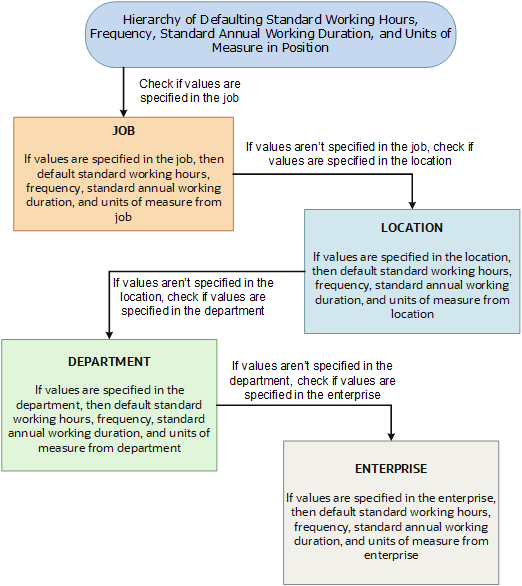Workday Information Defaults
The Full-Time Equivalent (FTE) is the number of hours worked by a worker on a full-time basis and is typically used to determine the workload.
You can either specify your own values or default the standard working hours, standard annual working duration, and the unit of measure (UOM) values. The workday information is used to calculate the full-time equivalent (FTE) of a worker.
You can default the workday information attributes from these entities in this order.
- Job
- Location
- Department
- Enterprise
Let’s look at how this works with the help of a diagram.

The defaulting logic for the standard working hours, frequency, standard annual working duration, and units of measure is given below.
| Entity | How it Works |
| Job | The first check is on the job specified in the position. If values for any of these attributes are available in the job, then these values are defaulted on the position. |
| Location | If any of the attribute values aren't specified on the job, then the check is done on the location specified in the position. If these values are specified in the location, then these values are defaulted on the position. |
| Department | If any of the attribute values aren't specified on the location, then the check is done on the department specified in the position. If these values are specified in the department, then these values are defaulted on the position. |
| Enterprise | If any of the attribute values aren't specified on the department, then the check is done on the enterprise. If these values are specified in the enterprise, then these values are defaulted on the position. |
If you change the business unit, department, location, or job in the position, then the existing defaulted workday information is also removed, if they are defaulted from any of these objects. However, this doesn't apply when you duplicate a position.
In addition, the defaulting hierarchy gets recalibrated when you provide a value in any of the entities. For example, if the standard annual working duration was earlier defaulted from the enterprise and you have specified a value for the standard annual working duration for a department now. The latest standard annual working duration value will now be defaulted from the department.